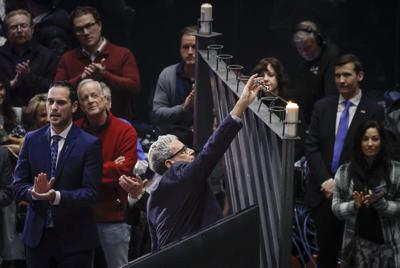In bad times, some good news: Toronto’s mayor didn’t blink, didn’t bail out on celebrations.
Olivia Chow did what mayors are supposed to do: Show up when people are down.
Contrast Chow’s backbone with the timidity of her Calgary counterpart: Mayor Jyoti Gondek pulled out of celebrations at Calgary city hall this month for fear of showing favouritism.
Having conducted her own textual analysis of a poster that merely mentioned support for Israel, Gondek insisted she could not betray any favouritism toward either side, Israeli or Palestinian, amid the fighting and killing on both sides. As if this holiday, religiously and historically linked to the survival of the Jewish people, must now be sealed off politically and theologically from the world’s only Jewish state.
Translation: If Calgary Jews wanted Her Worship’s blessings, they must be agnostic about Israel.
By performing this dubious litmus test, Gondek imposed an odious loyalty test upon Jews — an echo of the timeless antisemitic trope of dual loyalties. The mayor’s maladroitness is a microcosm for the rush to judgment of Jews.
It also reveals the misconception that blinds so many to the Middle East conflict — either conflating Jews with the Jewish state, or constraining the right of Jews to identify with Israel. Marking herself as the first mayor to boycott the ceremony in 35 years, Gondek argued she could not be “choosing one community over another.”
You might be interested in
Which begs the question: Why must any Canadian, Jew or non-Jew, feel compelled to choose only one side?
Why not support both sides — two states for two peoples, Israeli and Palestinian?
Why not see both sides of the debate and the divide? To be critical of Israel is perfectly kosher.
To be sure, one can support the idea of Israel while reviling Prime Minister Benjamin Netanyahu and his far-right government. Just as it is possible to rally for Palestinians while despising the Hamas regime that slaughtered Israeli civilians while serving up its own civilians as fodder.
When did the Middle East become so conveniently binary for Canadians — good versus evil, pitting two peoples against one another rather than alongside one another in neighbouring states? Most serious diplomats and scholars understand that, however elusive, the most enduring outcome is a two-state solution for two peoples.
Why then would Calgary’s mayor cling to the view that supporting Jews who support Israel somehow precludes support for Palestinians? Does she not know that most Jews also support a homeland for Palestinians?
Against that backdrop, it's worth asking why so many protesters have embraced the slogan, “From the river to the sea, Palestine will be free” — oblivious to the reaction it engenders in so many Canadians. I heard the chant often during my four years covering the Israeli-Palestinian conflict in the late 1990s as a foreign correspondent, almost always in tandem with another crowd favourite which doesn’t migrate or translate quite so smoothly: “With our soul, with our blood, we sacrifice for you, Palestine.”
The trouble with “the river to the sea” slogan is that it skips a step — self-determination for Jews. As long as one side believes it must eliminate an existing state — Israel — in order to create a new state from the Jordan River to the Mediterranean Sea, there will be no peace.
Whether or not this is in the hearts or minds of those chanting, the slogan imposes a one-state solution upon two peoples. Unless and until both sides have security and statehood, there will be no peace.
No, the slogan is not genocidal, merely unilateral — for it supersedes and thus presumes to eliminate (never mind annihilate) the existing state of Israel, population nine million people. The idea of one state for two peoples is as implausible (and anti-democratic) as telling the Muslims of Bosnia that they must be reunited with the Christians of Serbia; or that the Muslims who carved out the Islamic Republic of Pakistan upon Partition in 1947 must now be forcibly merged with Hindu-majority India; it is akin to telling Quebecers that there must always be one Canada from sea to sea to sea.
Beyond that slogan, there is another phrase that flirts with sophistry. You will increasingly hear people say that they are not antisemitic, merely anti-Zionist.
What does that mean? It can mean many things to many people, but to most Jews it means one thing — not just criticism of Israel (whose government many Jews also criticize) but opposition to the existence of Israel.
A few decades after the United Nations gave its blessings to Israel, it became fashionable to claim, belatedly, that “Zionism is racism.” As if self-determination should be available to all peoples — notably Pakistan's Muslims carving out their own homeland while displacing many Sikhs and Hindus — except for the Jewish people, notwithstanding their claims to indigeneity.
Today, that thinking has made a comeback and anti-Zionism is being normalized. People proudly proclaim themselves anti-Zionist, perhaps not realizing that it implies turning the clock back 75 years to either uproot or rule over those who live in the so-called “Zionist entity” today.
Or perhaps they realize it fully.
Put simply, to be anti-Zionist today is to be anti-Israel. To be anti-Israel is to show antipathy to all those Jews who believe Israel is a sanctuary and ought not to be a cemetery for Jews.
As to the larger question of whether or not an anti-Zionist is antisemitic, rest assured it is problematic for most Jews. Slogans matter, just as words matter, countries matter, people matter.
Appearances matter, and so do no-shows. It is telling that Her Worship the mayor of Calgary worships at the altar of indifference to Israel, but another current slogan comes to mind:
Happy Hanukkah.












